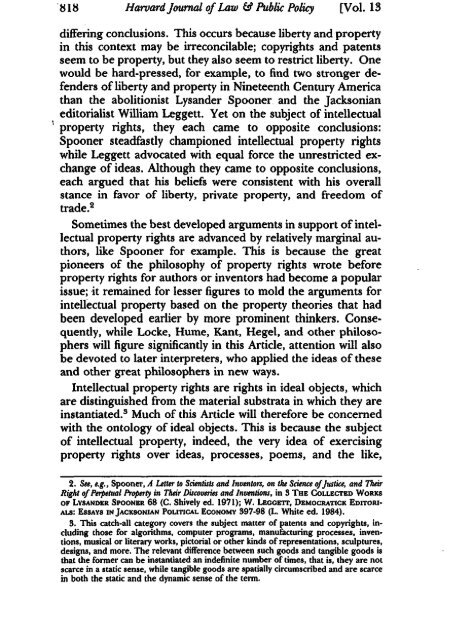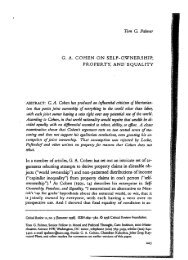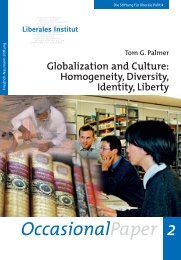Are Patents and Copyrights Morally Justified? - Tom G. Palmer
Are Patents and Copyrights Morally Justified? - Tom G. Palmer
Are Patents and Copyrights Morally Justified? - Tom G. Palmer
You also want an ePaper? Increase the reach of your titles
YUMPU automatically turns print PDFs into web optimized ePapers that Google loves.
• 818 HarvardJournal of Law & Public Policy [Vol. 13<br />
differing conclusions. This occurs because liberty <strong>and</strong> property<br />
in this context may be irreconcilable; copyrights <strong>and</strong> patents<br />
seem to be property, but theyalso seem to restrict liberty. One<br />
would be hard-pressed, for example, to find two stronger defenders<br />
ofliberty <strong>and</strong> property in Nineteenth Century America<br />
than the abolitionist Lys<strong>and</strong>er Spooner. <strong>and</strong> the Jacksonian<br />
editorialist William Leggett. Yet on the subject ofintellectual<br />
property rights, they each came to opposite conclusions:<br />
Spooner steadfastly championed intellectual property rights<br />
while Leggett advocated with equal force the unrestricted exchange<br />
of ideas. Although they came to opposite conclusions,<br />
each argued that his beliefs were consistent with his overall<br />
stance in favor of liberty, private property, <strong>and</strong> freedom of<br />
trade. 2<br />
Sometimes the best developed arguments in support ofintellectual<br />
property rights are advanced by relatively marginal authors,<br />
like Spooner for example. This is because the great<br />
pioneers of the philosophy of property rights wrote before<br />
property rights for authors or inventors had become a popular<br />
issue; it remained for lesser figures to mold the arguments for<br />
intellectual property based on the property theories that had<br />
been developed earlier by more prominent thinkers. Consequently,<br />
while Locke, Hume, Kant, Hegel, <strong>and</strong> other philosophers<br />
will figure significantly in this Article, attention will also<br />
be devoted to later interpreters, who applied the ideas ofthese<br />
<strong>and</strong> other great philosophers in new ways.<br />
Intellectual property rights are rights in ideal objects, which<br />
are distinguished from the material substrata in which they are<br />
instantiated. 3 Much of this Article will therefore be concerned<br />
with the ontology of ideal objects. This is because the subject<br />
of intellectual property, indeed, the very idea of exercising<br />
property rights over ideas, processes, poems, <strong>and</strong> the like,<br />
2. See, e.g., Spooner, A Letter to Scientists <strong>and</strong> inventors, on the Science offustice, <strong>and</strong> Their<br />
Right of Perpetual Property in Their Discoveries <strong>and</strong> Inventions, in 3 THE COLLECTED WORKS<br />
OF LYSANDER SPOONER 68 (C. Shively ed. 1971); W. LEOOETF, DEMOCRATICK EDITORS-<br />
AL5: ESSAYS IN JACKSONIAN POLITICAL ECONOMY 397-98 (L. White ed. 1984).<br />
3. This catch-all category covers the subject matter of patents <strong>and</strong> copyrights, including<br />
those for algorithms, computer programs, manufacturing processes, inventions,<br />
musical or literaryworks, pictorial or other kinds of representations, sculptures,<br />
designs, <strong>and</strong> more. The relevant difference between such goods <strong>and</strong> tangible goods is<br />
that the former can be instantiated an indefinite number oftimes, that is, they arenot<br />
scarce in a staticsense, whiletangible goods arespatially circumscribed <strong>and</strong>are scarce<br />
in both the static<strong>and</strong> the dynamic sense of the term.











